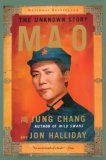Summary | Excerpt | Reviews | Beyond the Book | Readalikes | Genres & Themes | Author Bio

Critics' Opinion:
Readers' Opinion:
First Published:
Oct 2005, 832 pages
Paperback:
Nov 2006, 864 pages
 Book Reviewed by:
Book Reviewed by:
BookBrowse Review Team
Buy This Book
Mao clashed frequently with his tutors. He ran away from his first
school at the age of ten, claiming that the teacher was a martinet. He
was expelled from, or was "asked to leave," at least three schools
for being headstrong and disobedient. His mother indulged him but his
father was not pleased, and Mao's hopping from tutor to tutor was just
one source of tension between father and son. Yi-chang paid for Mao's
education, hoping that his son could at least help keep the family
accounts, but Mao disliked the task. All his life, he was vague about
figures, and hopeless at economics. Nor did he take kindly to hard
physical labour. He shunned it as soon as his peasant days were over.
Yi-chang could not stand Mao being idle. Having spent every minute of
his waking hours working, he expected his son to do the same, and would
strike him when he did not comply. Mao hated his father. In 1968, when
he was taking revenge on his political foes on a vast scale, he told
their tormentors that he would have liked his father to be treated just
as brutally: "My father was bad. If he were alive today, he should be 'jet-planed.'
" This was an agonising position where the
subject's arms were wrenched behind his back and his head forced down.
Mao was not a mere victim of his father. He fought back, and was often
the victor. He would tell his father that the father, being older,
should do more manual labour than he, the younger—which was an
unthinkably insolent argument by Chinese standards. One day, according
to Mao, father and son had a row in front of guests. "My father
scolded me before them, calling me lazy and useless. This infuriated me.
I called him names and left the house . . . My father . . . pursued me,
cursing as well as commanding me to come back. I reached the edge of a
pond and threatened to jump in if he came any nearer . . . My father
backed down." Once, as Mao was retelling the story, he laughed and
added an observation: "Old men like him didn't want to lose their
sons. This is their weakness. I attacked at their weak point, and I
won!"
Money was the only weapon Mao's father possessed. After Mao was
expelled by tutor no. 4, in 1907, his father stopped paying his son's
tuition fees and the thirteen-year-old boy had to become a full-time
peasant. But he soon found a way to get himself out of farm work and
back into the world of books. Yi-chang was keen for his son to get
married, so that he would be tied down and behave responsibly. His niece
was at just the right age for a wife, four years older than Mao, who
agreed to his father's plan and resumed schooling after the marriage.
The marriage took place in 1908, when Mao was fourteen and his bride
eighteen. Her family name was Luo. She herself had no proper name, and
was just called "Woman Luo." The only time Mao is known to have
mentioned her was to the American journalist Edgar Snow in 1936, when
Mao was strikingly dismissive, exaggerating the difference in their
ages: "When I was 14, my parents married me to a girl of 20. But I
never lived with her . . . I do not consider her my wife . . . and have
given little thought to her." He gave no hint that she was not still
alive; in fact, Woman Luo had died in 1910, just over a year into their
marriage.
Mao's early marriage turned him into a fierce opponent of arranged
marriages. Nine years later he wrote a seething article against the
practice: "In families in the West, parents acknowledge the free will
of their children. But in China, orders from the parents are not at all
compatible with the will of the children . . . This is a kind of 'indirect rape.' Chinese parents are all the time indirectly raping
their children . . ."
Excerpted from Mao by Jung Chang and Jon Halliday Copyright © 2005 by Jung Chang. Excerpted by permission of Knopf, a division of Random House, Inc. All rights reserved. No part of this excerpt may be reproduced or reprinted without permission in writing from the publisher.





The Funeral Cryer by Wenyan Lu
Debut novelist Wenyan Lu brings us this witty yet profound story about one woman's midlife reawakening in contemporary rural China.
Your guide toexceptional books
BookBrowse seeks out and recommends the best in contemporary fiction and nonfiction—books that not only engage and entertain but also deepen our understanding of ourselves and the world around us.